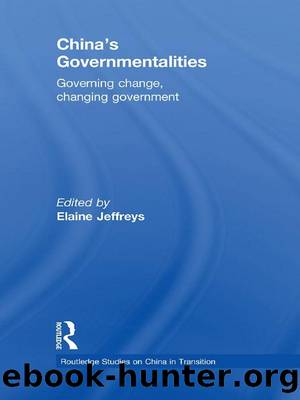China's Governmentalities: Governing Change, Changing Government by Jeffreys Elaine

Author:Jeffreys Elaine [Elaine, Jeffreys]
Language: eng
Format: epub
Tags: Political Science, General
ISBN: 9780415547444
Google: h9EAiYLuTAUC
Goodreads: 7355166
Publisher: Routledge
Published: 2009-01-15T07:06:13+00:00
5 Building âcommunityâ
New strategies of governance in urban China
David Bray
Chinaâs rapid transformation over the past decade has generated a great deal of commentary, yet little attention has been devoted to the growing prominence of the idea of âcommunityâ within public discourse in the Peopleâs Republic of China (PRC). The Chinese term for community, shequ, was used by Chinaâs first generation of sociologists in the 1930s and 1940s, but it disappeared from public discourse when the Communist Party-led government banned sociology in the early 1950s.1 The rehabilitation of sociology as a discipline in the 1980s has seen the term return to general scholarly usage (Guo 1993: 3). More importantly, perhaps, the term has found its way into official governmental discourse: first, in the mid-1980s with the promotion of âcommunity servicesâ (shequ fuwu); and second, since the mid-1990s, with the strategy for âcommunity buildingâ (shequ jianshe). The growing concern with the concept of community in China reflects a recent trend, apparent in a number of other polities, to re-valorize the role of community within systems of governance (Rose 1999: 167). From New Labourâs âThird Wayâ to the New Communitarians of the American right, the âcommunityâ has been presented as a resource that can be mobilized to address a wide range of political, social, ethical and economic problems. While the discussion of âcommunityâ in China is situated within domestic debates around local governance and social welfare that have emerged in response to the decline of the planned economy and associated institutions, it is also informed by international discourses on community. In China as elsewhere, âcommunityâ has been posited in part as a counterweight to cultural, social and political fragmentation which is often seen as a negative consequence of globalization.
One of the more interesting aspects of the emergence of community policy in China is the speed with which the concept of âcommunityâ has been transformed from a relatively abstract idea into a specific institutional model. According to central government policy documents circulated nationally at the end of 2000 (Minzhengbu 2000), the âcommunityâ is now designated as the basic unit of urban social, political and administrative organization. The objective of this chapter is to chart the development of this policy and the discourse relating to its practical implementation. The chapter is divided into five sections. First, I discuss concepts of community in the broader global context, with a particular focus on how debates on âThe Third Wayâ and âNew Communitarianismâ have influenced thinking on the role of âcommunityâ. Second, I explore how the recent emergence of a discourse on âcommunityâ has been central to the formation of new ways for government to think about and address social problems in urban China. Third, I describe and analyse the âShenyang Modelâ, one of the most influential regional models for the practical implementation of âcommunity buildingâ in China today. Fourth, I examine how notions of âself-governanceâ and ethical training inform the practical operation of âcommunity buildingâ. Finally, I conclude that âcommunity buildingâ presents a new and hybrid strategy
Download
This site does not store any files on its server. We only index and link to content provided by other sites. Please contact the content providers to delete copyright contents if any and email us, we'll remove relevant links or contents immediately.
What's Done in Darkness by Kayla Perrin(25500)
Shot Through the Heart: DI Grace Fisher 2 by Isabelle Grey(18220)
Shot Through the Heart by Mercy Celeste(18160)
The Fifty Shades Trilogy & Grey by E L James(17776)
The 3rd Cycle of the Betrayed Series Collection: Extremely Controversial Historical Thrillers (Betrayed Series Boxed set) by McCray Carolyn(13189)
The Subtle Art of Not Giving a F*ck by Mark Manson(12912)
Scorched Earth by Nick Kyme(11833)
Stepbrother Stories 2 - 21 Taboo Story Collection (Brother Sister Stepbrother Stepsister Taboo Pseudo Incest Family Virgin Creampie Pregnant Forced Pregnancy Breeding) by Roxi Harding(11040)
Drei Generationen auf dem Jakobsweg by Stein Pia(10217)
Suna by Ziefle Pia(10186)
Scythe by Neal Shusterman(9263)
International Relations from the Global South; Worlds of Difference; First Edition by Arlene B. Tickner & Karen Smith(8608)
Successful Proposal Strategies for Small Businesses: Using Knowledge Management ot Win Govenment, Private Sector, and International Contracts 3rd Edition by Robert Frey(8419)
This is Going to Hurt by Adam Kay(7695)
Dirty Filthy Fix: A Fixed Trilogy Novella by Laurelin Paige(6453)
He Loves Me...KNOT by RC Boldt(5805)
How to Make Love to a Negro Without Getting Tired by Dany LaFerrière(5378)
Interdimensional Brothel by F4U(5304)
Thankful For Her by Alexa Riley(5162)
